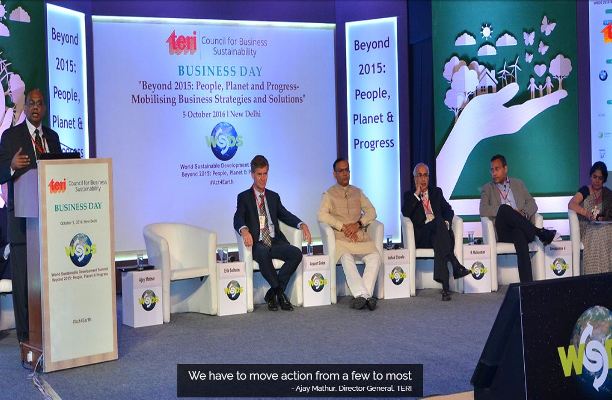Ingersoll Rand has collaborated with TERI for the TERI Annual World Sustainable Development Summit (WSDS), October 5- 8, in New Delhi.
An associate partner of the Business Day at TERI WSDS, Ingersoll Rand led the Thematic Track “Corporate Dialogue: Transitioning to More Efficient HVAC Systems with Low GWP Refrigerants.”
Randal Newton, vice president of engineering operations for Ingersoll Rand, joined experts from environment, energy and sustainability services on the panel, to share views on energy efficiency as a key element in the global collaboration to preserve the ozone layer, and mitigate climate change.
At the Summit’s inaugural Session, Randal Newton, vice president, Engineering Operations of Ingersoll Rand said, “Technology breakthroughs in refrigerants and better control and maintenance of systems are providing the foundation for a significant reduction in lifecycle emissions in buildings and in transport refrigeration. Ingersoll Rand supports the HFC amendment to the Montreal Protocol in 2016 as one of the key initiatives to reduce the greenhouse effect on our environment.”
“With India formally joining the Paris Agreement, we are confident that the search for solutions would continue further with more R&D activities and industry-led innovations in search for low-GWP HFC alternatives,” he added.
The panel also explored how the Montreal Protocol can provide funding support for transitions offering greater efficiency and next generation, low global warming potential (GWP) solutions for room air conditioning systems.
Ajay Matur, director general, TERI, said, “The increasing use of air conditioning systems is exponentially driving up the demand for energy. While this may be contributing to the quality of life, it has also produced direct emissions of refrigerants that have a very high Global Warming Potential (GWP). There is, therefore, an emergent need to move towards energy-efficient air conditioners with low GWP refrigerants and climate-friendly designs.”
“This discussion at World Sustainable Development Summit on the need to create such a transition is a key step that will aid the adoption of a variety of new measures that engage meaningfully with policy makers, manufacturers and consumers at large,” Matur said. “At TERI we will continue to collaborate with the government on this very important environmental challenge of our times.”
In 2014, Ingersoll Rand announced its Climate Commitment to reduce greenhouse gas (GHG) emissions from its products and operations by 2030. The Ingersoll Rand Climate Commitment pledges to:
- Cut the refrigerant GHG footprint of its products by 50 percent by 2020 and incorporate lower-global warming potential alternatives across its portfolio by 2030;
- Invest $500 million in product-related research and development by 2020 to fund the long-term reduction of GHG emissions; and
- Reduce company operations-related GHG emissions by 35 percent by 2020.
To date, the company’s Climate Commitment has supported the avoidance of approximately 2 million metric tons of CO2e globally, which is the equivalent of avoiding annual CO2 emissions from energy used in more than 270,000 homes or more than 2.1 billion pounds of coal burned. By 2030, the company expects to reduce its carbon footprint by 50 million metric tons.
Rajani Baburajan
editor@greentechlead.com

